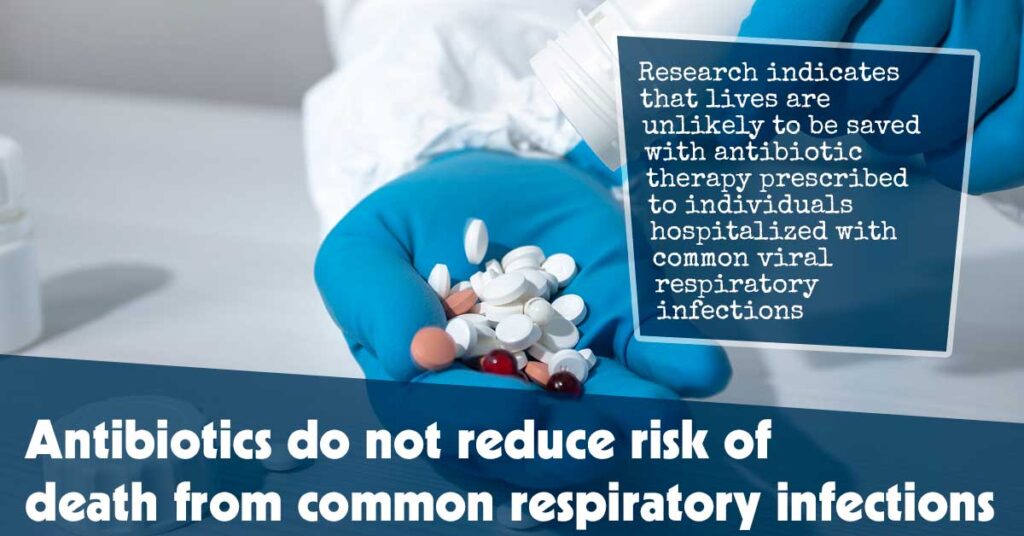Antibiotics are prescribed to most acute viral respiratory infection hospitalization patients. Unfortunately, research now suggests that this strategy may not save lives for individuals hospitalized for viral respiratory illnesses such as influenza.
Experiences from the Covid-19 pandemic suggest that antibiotics may not be necessary in most viral respiratory infection patients and that concerns about co-infection may be overblown. This study supports this evidence, showing that prescribing antibiotics to individuals hospitalized with respiratory infections does not tend to reduce mortality within 30 days; instead it could increase their antimicrobial resistance risk significantly. This type of unnecessary prescribing poses serious implications given its potential negative impact on antimicrobial resistance threat levels.
Respiratory infections account for roughly 10% of global disease burden and are among the primary reasons for antibiotic prescriptions worldwide. While viral infections don’t respond or require antibiotics treatment, fears about possible co-infection often lead to precautionary prescription of antibiotics as a preventative measure.
Concerns surrounding COVID-19 co-infection led to widespread antibiotic usage both within communities and hospitals, and studies indicate this practice. Studies revealed that antibiotics were administered to over 70% of COVID-19 cases in some countries despite only being necessary in 1 out of every 10 cases.
This analysis examined the effect of antibiotic treatment on mortality for 2,111 hospital admissions who tested positive with a throat or nasopharyngeal swab at admission for SARS-CoV-2, respiratory syncytial virus or virus influenza virus between 2017-2021.
At hospital admission, routine respiratory infection tests such as blood cultures and throat or nasopharyngeal swabs for common bacterial and viral pathogens were taken, including individuals who required antibiotic treatment due to confirmed infections or those with multiple infections that required exclusion from analysis.
Antibiotic treatment was initiated upon admission for more than half of viral respiratory infection patients to hospital, while an additional 168 individuals received them later during hospitalization; as a total, 63% were provided antibiotics to treat respiratory infection during their hospital stay.
Overall, 168 individuals died within 30 days, of whom 119 individuals received antibiotics when admitted and 27 later while hospitalized; 22 people did not receive antibiotics at all.
Analysis conducted after controlling for type of virus, age, sex, disease severity and underlying illnesses revealed that hospital stays during which antibiotic treatment began anytime were twice as likely to die within 30 days than stays without antibiotic treatment; mortality risk rose 3% for every day that an antibiotic treatment started compared with no treatment at all – though starting antibiotic treatment at hospital admission didn’t raise its risks of death within 30 days.
Although analyses were adjusted to account for both severity and prevalence of disease, this paradoxical result could still be caused by patterns of antibiotic prescription where individuals with more underlying illnesses and sicker individuals were both more likely to get antibiotics as well as die.
Reducing the duration and usage of in-hospital antibiotic treatments for viral respiratory infection patients would lower risks associated with antibiotic exposure side effects and help tackle rising antibiotic resistance issues. More evidence from prospective randomized studies must however be collected in order to establish whether such patients require antibiotic treatment at hospital admission.
There are some limitations to the study, including it being an observational one and not being able to establish causation; although gender, age, virus type and underlying illnesses were taken into account when making adjustments for sex, age and virus type as well as smoking; additionally unreported factors like socioeconomic background may have had an influence. Unfortunately no data were available regarding biomarkers/biochemistry such as white blood cell counts, CRP levels and creatinine.

